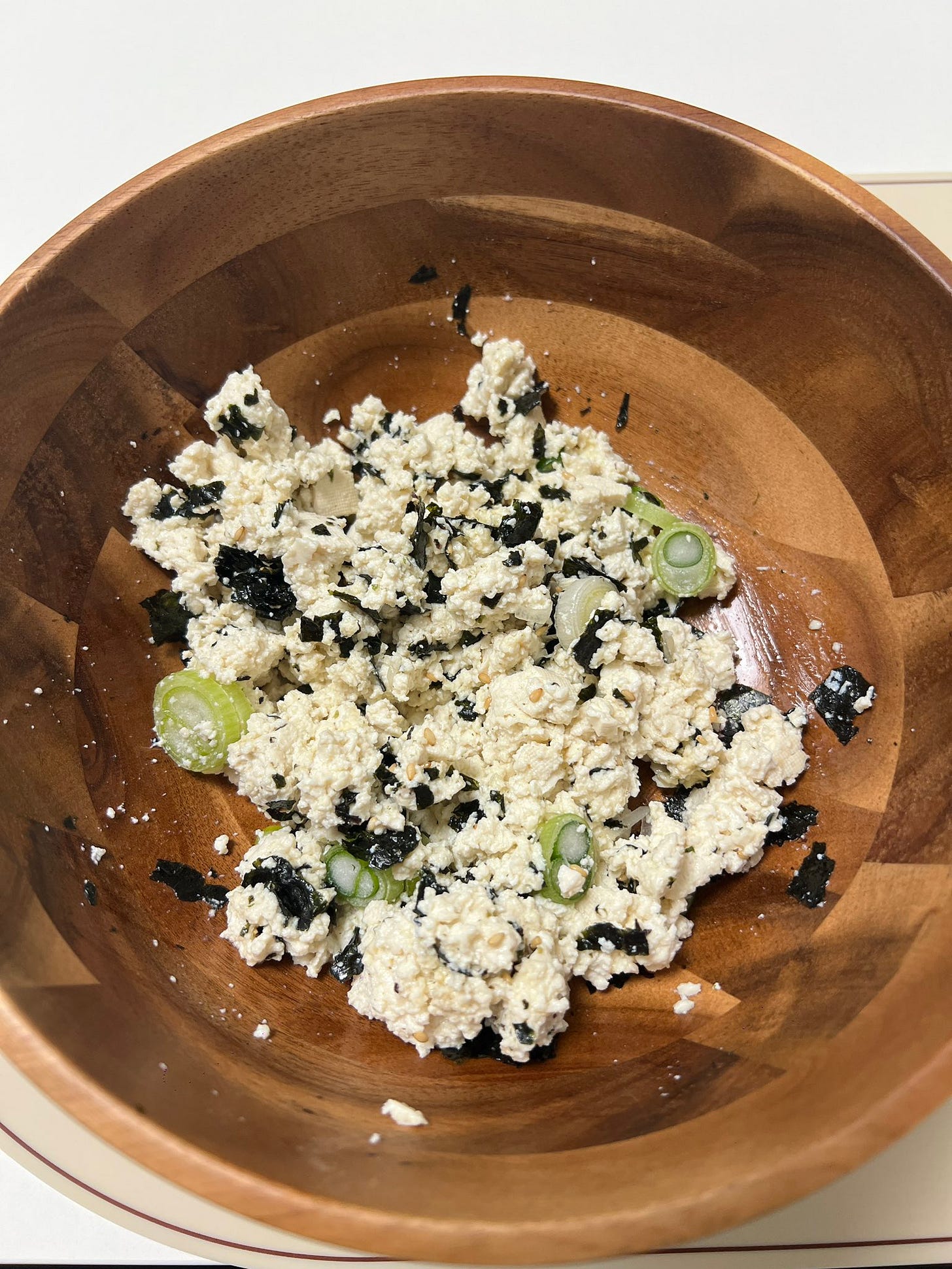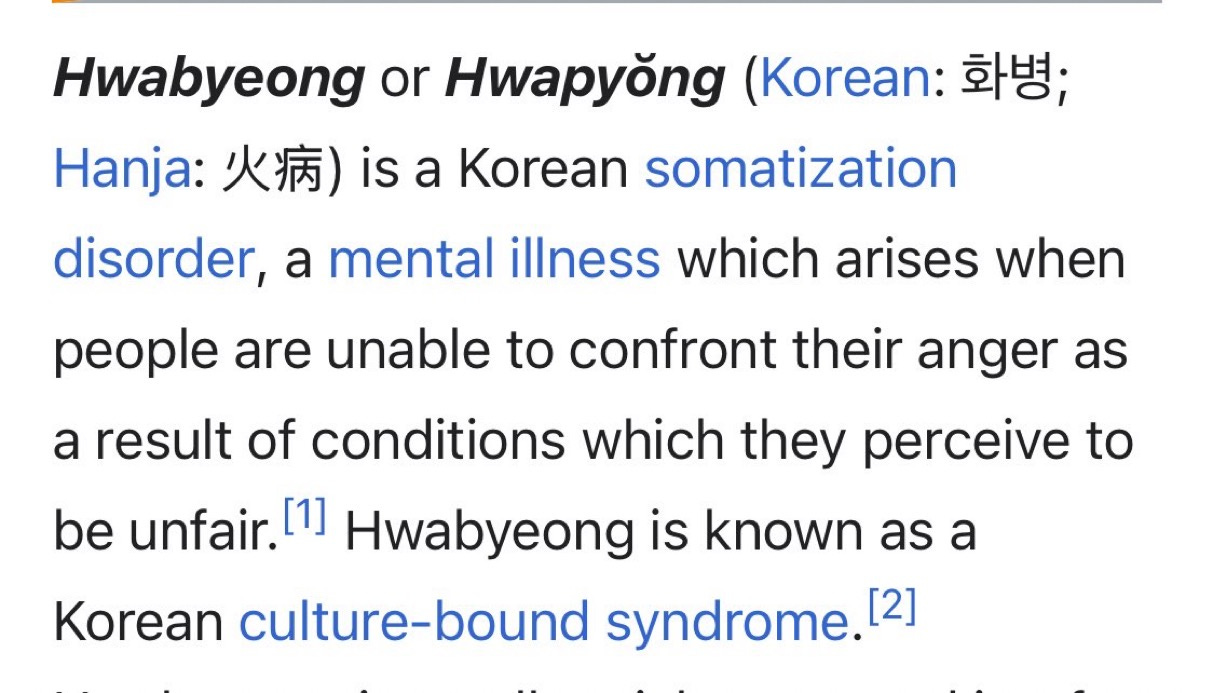안녕! It’s Ari, your chatty Korean friend and weekend reminder. 🎉 Before everything else,
📢 My First Book is Out Now! 🎉
I’m beyond excited to share that my very first short read, I Like You, but Not Your iPhone, is officially released!
📝 68 pages of insights and reflections on modern South Korea, gender, and cultural shifts.
🔥 Special Launch Offer: $9.99 for the First Week! (Price increases to $14.99 after that.)
As many of you know, English isn’t my native language, but I worked hard on this, with ChatGPT helping proofread my writing to make it as clear as possible.
After today’s usual food recommendation, you’ll get an exclusive sneak peek—the introduction and the first part of Chapter 1 from my book! Hope you enjoy it. 💙
Mashed Tofu with Gim

With egg prices skyrocketing in some countries, tofu is a great alternative protein source. If you're a vegetarian—or just looking for a healthy, budget-friendly dish—you’ll love this simple tofu recipe!
This dish was introduced by Jeong Hee-won, a well-known celebrity doctor who shares healthy recipes to help young people break free from junk food habits. One of his recommended dishes is mashed tofu with gim (Korean dried seaweed), a no-cook, protein-packed snack or side dish that pairs perfectly with rice.
It’s incredibly easy to make—no stove or heat required! Check out the recipe below and enjoy a nutritious, lazy-weekend treat. Watch the cooking video if you need a visual guide (the cooking starts at 11:57) and bon appétit! 😋
For 1 serving,
Ingredients:
½ block tofu (150g)
1 green onion (white part, about 10cm)
1 sheet gim (dried & not-seasoned, standard kimbap-sized)
1 tbsp Yeondu (Korean seasoning sauce) or replace with chicken stock or a vegetarian alternative
½ tbsp sesame oil
A pinch of sesame seeds
Directions:
Mash the Tofu: Drain excess water from the tofu and place it in a bowl. Use a fork to mash it into small crumbles.
Chop the Green Onion: Cut the white part of the green onion into thin slices.
Crush the Gim: Place the gim sheet in a plastic bag and crush it into small flakes.
Mix Everything: Add the mashed tofu, chopped green onion, crushed gim, Yeondu (or its substitute), sesame oil, and sesame seeds to a bowl. Mix well until evenly combined.
(Sneak Peek) I Like You, but Not Your iPhone
(The following is the introduction and the first part of Chapter 1 from my short read, I Like You, but Not Your iPhone.)
Invitation to a Country That’s Disappearing
At midnight on Saturday, November 9, 2024, The Family Man, a 2000 American movie, was airing on KBS, one of South Korea’s national broadcasting channels. The film tells the story of a wealthy banker who wakes up on Christmas morning to find himself living a humble life, married to the love he once left behind. It’s a heartwarming tale about family and love, wrapped in the charm of a holiday movie. But this particular broadcast came with an unusual label: Featured Film on Tackling the Low Birthrate Crisis.
On the same channel, a new daily drama, Marry Me, Maenggong, airs every weekday evening. According to the show’s official website, the planning intent states: “Through this drama, we want to convey that it is marriage through which I—not anyone else—become happy, and that the most selfish choice I can make for myself is marriage and childbirth.”
After the drama, a public service advertisement airs, featuring laughing babies and little children tumbling adorably under the Whitney Houston-style slogan, “Children Are Our Future.”
South Korea is famously known for having the lowest birth rate in the world. In 2023, the birth rate recorded 0.72—a new low after 0.78 in 2022. To put this number into perspective, let’s say there are 100 couples in a country, making the total population 200. Since only half of them (100 women) can give birth, a fertility rate of 0.72 means that this generation will have only 72 children. Then, in the next generation, assuming an equal number of men and women, only 36 women will be left to have children, leading to just about 26 births. In just two generations, the number of newborns has shrunk from 72 to 26, setting the stage for an irreversible population collapse. No wonder the national broadcasting channel is so desperate to nag more Koreans into getting married and having children.
But while some blame South Korea’s record-low birth rate on economic factors like skyrocketing housing prices and wealth inequality, this book will focus on a deeper, more fundamental issue: why so many South Korean women are choosing to opt out of dating, marriage, and motherhood altogether.
This book will be especially helpful for anyone interested in feminism, anti-feminism, or the famous 4B Movement—a South Korean feminist movement that stands for four no’s: no dating with men, no sex with men, no marriage with men, and no having babies with men. You’ll learn the historical and cultural background of how and why extreme anti-feminism and the 4B Movement emerged in South Korea—standing out even among other patriarchal Asian countries.
As a born-and-raised Korean woman, I will share my personal stories alongside my research as the writer of Annyeong Ari, a weekly email newsletter covering Korean news, culture, food, and language.
Let’s begin our journey to a country that’s disappearing faster than you can say Annyeong—with a bedtime story.
Chapter 1: Simcheong, Janghwa, and Hongryeon
Long, long time ago, in a little village by the river, there lived a kind and beautiful girl named Simcheong. She lived with her father, Sim Hak-gyu, who was blind. Now, her father wasn’t just any blind man—he was the gentlest, most loving father you could imagine, but life was hard for the two of them. They were poor, and Simcheong worked tirelessly to care for her father and make sure they had enough to eat.
One day, her father heard a rumor. “Simcheong,” he said, “they say if I donate 300 sacks of rice to the temple, the Buddha will bless me, and I’ll be able to see again.” Simcheong’s heart ached. How could they possibly get 300 sacks of rice when they barely had enough for dinner? But Simcheong loved her father more than anything in the world. So she thought and thought until, one day, she made a brave decision.
“I’ll do it,” she said to herself. “I’ll find a way to get 300 sacks of rice, no matter what it takes.”
Now, in those days, there were sailors who would pay a fortune to offer someone as a sacrifice to the Sea King. It was said that sacrificing a pure soul would bring calm seas and safe journeys. So Simcheong, without hesitation, offered herself to the sailors. “Take me,” she said, “and in return, give my father 300 sacks of rice.”
The sailors were amazed by her bravery and agreed. They took her out to the vast ocean, where the waves were high, and the wind roared. Then, with a heavy heart, they lowered Simcheong into the sea. But…
✨ What happens to the brave and devoted Simcheong?
To find out—and to dive deeper into the stories shaping modern South Korea—grab your copy 👉here!
Mini Korean Lesson: Hwabyeong & Aekttem
Are you struggling with a bad political leader in your country? Was the day they got elected one of the worst days of your life? 😱 You couldn’t believe how many of your fellow citizens had such poor judgment of character.
And the worst part? You didn’t even vote for that leader—yet you’re the one stuck dealing with the consequences of their supporters’ terrible mistake.
Trust me, I know how it feels. This soon-to-be two-time president-impeaching country even has an official illness to describe the symptoms of this rage and frustration. It’s called 화병 (Hwabyeong). 👆
Although it’s classified as a mental illness, when it gets serious, it can cause various physical symptoms. Personally, I developed insomnia, spontaneous crying, and even IBS because of it. Hwabyeong is no joke. 🫠
The problem? In many cases, the root cause of Hwabyeong isn’t something we can fix on a personal level. Since South Koreans have long dealt with unfixable frustrations—whether political or social—we developed a kind of self-defense mechanism: 액땜 (Aekttem).
Aekttem refers to the belief that small misfortunes help ward off greater disasters. It’s a way to console ourselves and others, reassuring that the bad luck we experience now might prevent something worse from happening later.
Many Koreans use this expression to comfort someone going through temporary hardship. So whenever you see the cause of your Hwabyeong on TV, remind yourself—it’s just Aekttem. Maybe this means we’ve hit rock bottom, and things can only get better from here.
Thanks for reading! 🥰 If you enjoyed this newsletter, you’ll love my first book, I Like You, but Not Your iPhone! 📖✨ It’s available now, and for the first week only, you can grab it for $9.99 before the price goes up.
If you’d like to support my work in other ways, you can always buy me a coffee! ☕️ I’ll be back next week with more. 안녕!






Compliments to you on a thoughtful, well-written and thought-provoking piece. Your exploration of the topic of feminism -- this doesn't feel like the right word...women's rights? patriarchy? What you discuss is much bigger than a simple one-word label! -- in South Korea from folktales to film to social media and politics is fascinating. I appreciated your balanced and fair approach, especially in your conclusion. Thank you for sharing your perspective and insights! Best wishes!
Hi Ari, did read last night, but then doing a pre cyclone safety check of my kids place. Had been to my mums earlier in the evening, but she at age 92 was better prepared than us all; "I have had some experience with this before.."
So, your Tofu with Gim a definite add to my disaster prep menu, due to ease, no need for heat and that we have some great UHT tofu that lasts for years(trust me, from my remnant Covid stores, like a few years beyond UBDate).
Your book teaser is great and I sense a bit of novelty and thoughtfulness in the mix.
So, will try for a purchase next week.
And your K language piece about Hwabyeong and Aekttem. Can you unpack the words?
Think, more universal an experience as you say, and not an"illness", though people are severely impacted.
The pathologization of psychic distress and trauma and the de-railing from its origins and causation. The illness paradigm implies the victim at fault.
And how e rationalise bad stuff.
Respect as Always.